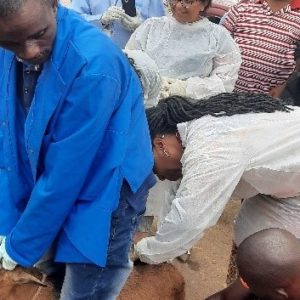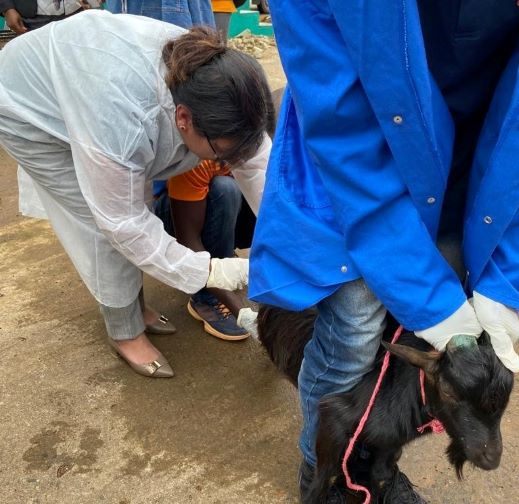Monrovia- In Liberia, several rabies cases have been confirmed by the Central Veterinary Laboratory in dogs, as endemic and posing a public health threat, officials say.
According to a press release, each year over a thousand cases of animal bites are reported. Similarly, there have been several clinical confirmed cases of rabies in human leading to 100% death.
The Government of Liberia in collaboration with its One Health platform partners and the division of Veterinary Services at the Ministry of Agriculture (MoA), has launched a 13 – day national emergency vaccination campaign in a fight to eradicate or end rabies and peste des petits ruminant (PPR) in animals.
The launch was held July 1, 2022, at the MoA central office in Gardnersville.

The vaccination activity is expected to cut across both the central and western regions of Liberia, covering Montserrado and five border counties which include Gbarpolu, Grand Cape Mount, Bong, Lofa, and Nimba.
The campaign is being done to ensure 70% of dog population are vaccinated against rabies, with a similar effort applied to sheep and goats, to guide against PPR.
Significantly, this is intended to eradicate or reduce rabies infection caused by a virus that affects the central nervous system of mammals, including humans, most likely leading to their death, if not treated before symptoms begin, once bitten by a rabid animal.
Also, PPR is a highly infectious disease of small ruminants like goats and sheep, characterized by high rates of morbidity and mortality, according to the Office International des Epizooties (OIE), which says, “PPR has surmounted the West African region with US $1.5 to 2 billion losses each year, home to 330 million of the world’s poorest people, many of whom depend on cattle rearing for livelihoods, yet 80% of the world’s sheep and goats dreams are shuttled when animals livestock are reduced due to preventable disease like PPR.”
Eradication of both diseases, rabies and PPR is a target for the world by 2030, as PPR alone threatens food security and the livelihoods of smallholder farmers, and prevents animal husbandry sectors from achieving their economic potential, now being confirmed in many counties of Liberia.
Moreso, the World Health Organization (WHO), has said, globally, rabies has led to over 60,000 human deaths each year, in over 100 countries, mostly affected by under-served communities with limited access to health and veterinary services.
In Liberia, several rabies cases have been confirmed by the Central Veterinary Laboratory in dogs, as endemic and posing a public health threat, for which each year over a thousand cases of animal bites are reported. Similarly, there have been several clinical confirmed cases of rabies in human leading to 100% death.
National strategies for the control and eradication of the two diseases (rabies and PPR) have been developed under the guidance of international bodies, including OIE, FAO, ECOWAS, and supported by
USAID Global Health Security Agenda (GHSA) activity and the Regional Diseases Surveillance Enhancement Project supported by the World bank.
“A mass vaccination campaign in Liberia, for rabies and PPR control and eradication has gained FAO planned support with a proposed 400,000 doses of PPR vaccines and US $15,000 dollars provided, while USAID funded GHSA program has in its 2022 work plan provisional US $15,000 for vaccination of animals against rabies.”
The Liberia veterinary service has already received 30,000 doses of rabies vaccine from the OIE, and so, for economic reasons, the two vaccination campaigns will be organized jointly by the same teams of veterinary services at the same time and using narratives from a previous campaign held in 2021.
“Vaccines are targeted at goats and sheep older than three months, for the PPR campaign, and dogs, cats, and monkeys older than two months, will receive the rabies vaccine.”
Even though the country’s animal population is poorly known, due to a lack of livestock census done, however, a total of 90,250 animals are expected to be vaccinated for both campaigns.
Partners supporting the initiative are Breakthrough ACTION Liberia, FAO, WHO, OIE, World Bank and ECOWAS, in collaboration with the MoA and the One Health platform.

